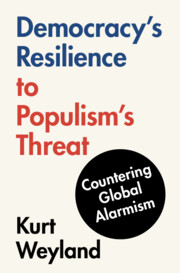Book contents
- Democracy’s Resilience to Populism’s Threat
- Democracy’s Resilience to Populism’s Threat
- Copyright page
- Contents
- Tables
- Acknowledgments
- 1 The Populist Threat to Democracy
- 2 How Institutional Constraints and Conjunctural Opportunities Condition Populism’s Threat to Democracy
- 3 Neoliberal and Right-Wing Populism in Latin America
- 4 “Bolivarian” and Left-Wing Populism in Latin America
- 5 Right-Wing and Traditionalist Populism in Europe
- 6 Right-Wing Populism in the USA
- 7 Conclusion
- References
- Index
2 - How Institutional Constraints and Conjunctural Opportunities Condition Populism’s Threat to Democracy
Published online by Cambridge University Press: 11 January 2024
- Democracy’s Resilience to Populism’s Threat
- Democracy’s Resilience to Populism’s Threat
- Copyright page
- Contents
- Tables
- Acknowledgments
- 1 The Populist Threat to Democracy
- 2 How Institutional Constraints and Conjunctural Opportunities Condition Populism’s Threat to Democracy
- 3 Neoliberal and Right-Wing Populism in Latin America
- 4 “Bolivarian” and Left-Wing Populism in Latin America
- 5 Right-Wing and Traditionalist Populism in Europe
- 6 Right-Wing Populism in the USA
- 7 Conclusion
- References
- Index
Summary
My theory argues that populist chief executives manage to concentrate power and asphyxiate democracy only under special, restrictive conditions, namely when a distinctive institutional weakness and a special conjunctural opportunity for achieving overwhelming mass support coincide. I distinguish 3 types of institutional weakness: a) susceptibility to para-legal change in Latin American presidentialism; b) exceptionally high instability in that region; and c) the attenuated checks and balances of European parliamentarism. Conjunctural opportunities arise from huge revenue windfalls, with which populist leaders can “buy” massive support via ample benefit distribution; or from acute, severe, yet resolvable crises: If populist leaders can bring “miraculous” relief, they receive an outpouring of support. As my scoring of 40 cases shows, these institutional weaknesses and conjunctural opportunities combine in ways that correspond to 3 wellknown types of populism. Accordingly, the theory elucidates the unusual conditions under which a few neoliberal populists in Latin America, leftwing, “Bolivarian” populists in Latin America, and rightwing, traditional populists in Europe have destroyed democracy.
Keywords
- Type
- Chapter
- Information
- Democracy's Resilience to Populism's ThreatCountering Global Alarmism, pp. 30 - 73Publisher: Cambridge University PressPrint publication year: 2024

